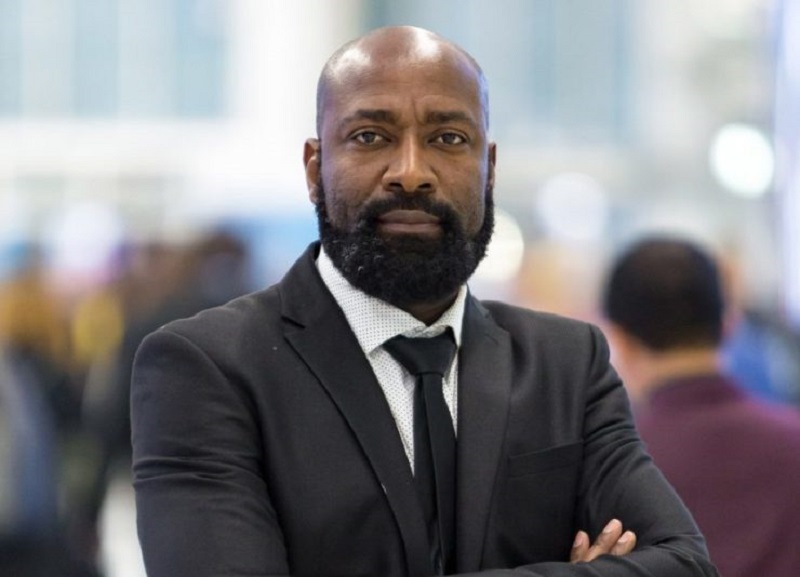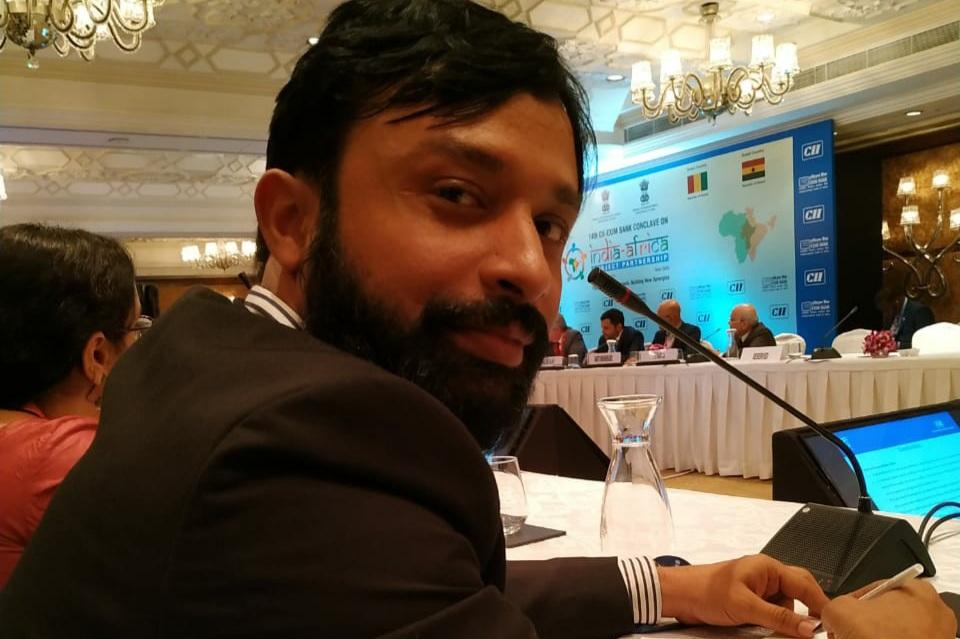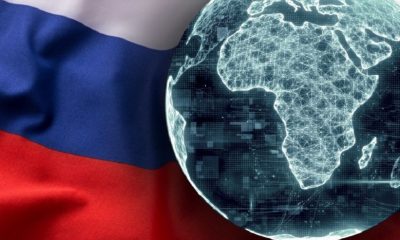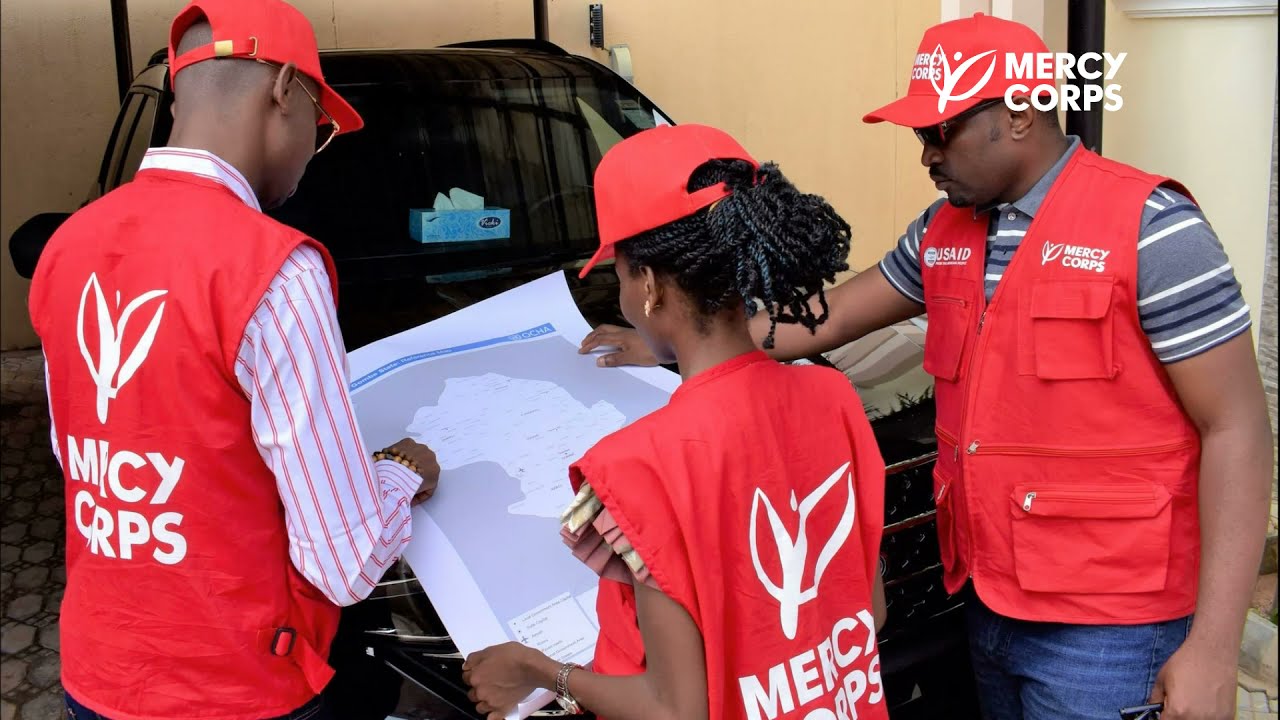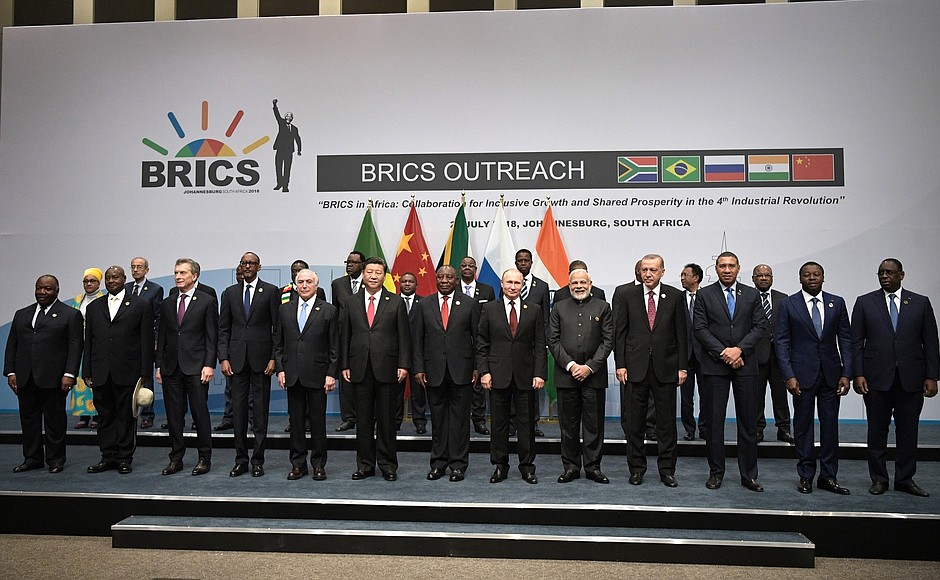World
Russia’s African Trade Growing But Largely Military Equipment
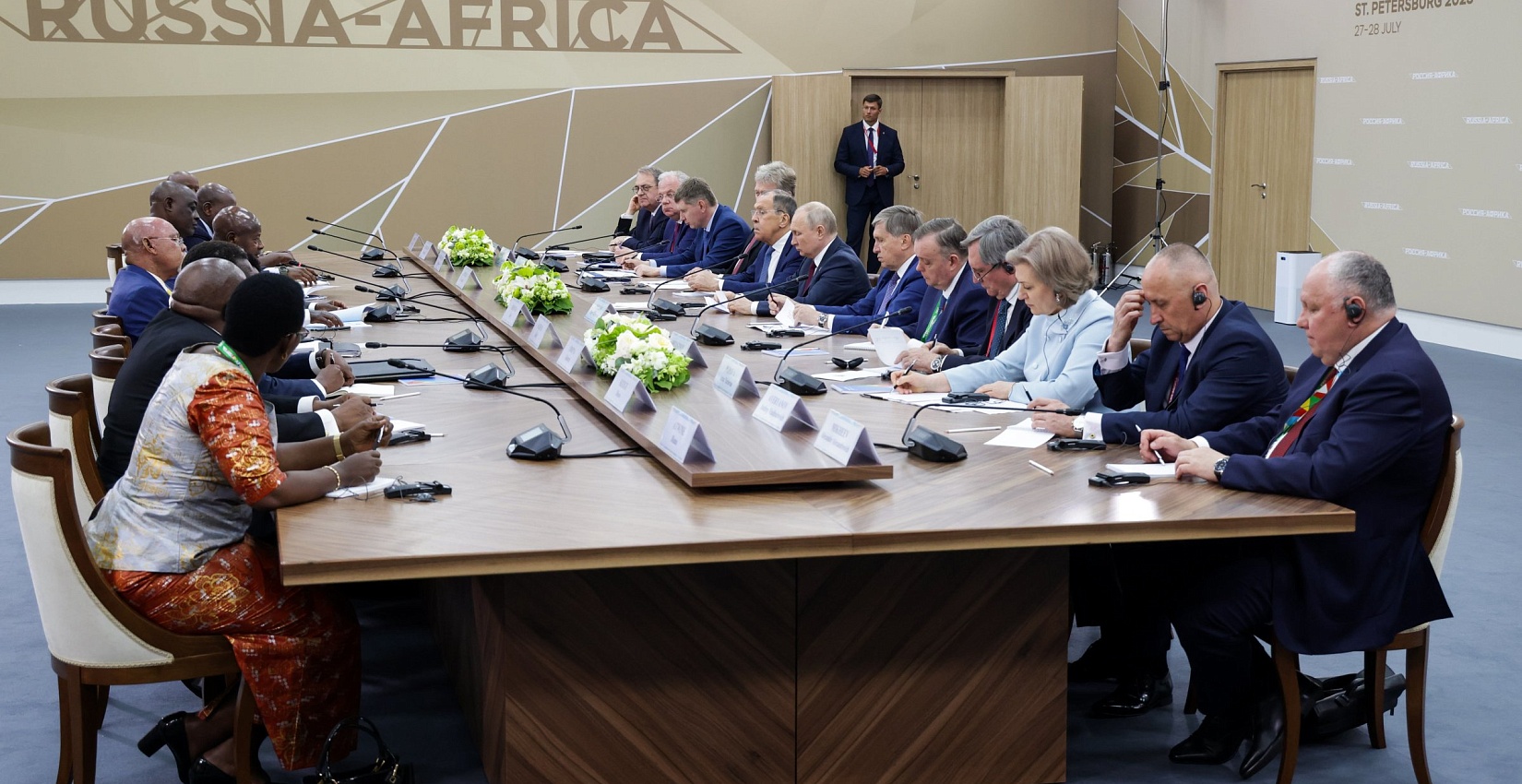
By Kestér Kenn Klomegâh
After two symbolic African leaders’ summits, Russia’s trading is steadily increasing but significantly in exports of military weapons and equipment. According to Kremlin reports, Russian President Vladimir Putin said the trade turnover between Russia and African countries had increased by almost 35% in the first half of 2023 despite international sanctions. During the first summit, Putin promised to double trade with African states within five years as he sought to win new friends with offers of nuclear power plants and fighter jets. He fixed the expected figure at $40 billion, which he repeated in several speeches until the last summit held in July 2023 in St. Petersburg.
According to the Russia Today (RT) report, under the headline “Russia expanding African defence partnerships” issued 5th Sept. 2024, Russia’s arms exporter Rosoboronexport has outlined plans for joint ventures regarding military equipment with the continent. That report indicated that the Russian arms export agency Rosoboronexport has been advancing multiple cooperation projects with African countries, quoted Aleksandr Mikheev, the agency’s head. Mikheev, speaking on the sidelines of the Egypt International Airshow, further said his agency was working on several industrial cooperation projects with African countries, focusing on the licensed production of small arms, ammunition, armoured vehicles, and fast combat boats.
The head of the Russian arms export agency also noted the increasing importance of Africa and the Middle East in the company’s overall business. “The combined share of Middle Eastern and African countries in Rosoboronexport’s order portfolio exceeds 50%, which translates to over $25 billion,” he said. Mikheev revealed that over 40 African nations are actively engaged in military-technical collaboration with Russia. “There is a very significant share of signed and executed contracts in the order portfolio. Mostly, of course, it is equipment, air force, air defence, helicopters, small arms, electronic warfare.”
Last December, the Rosoboronexport head said that African countries bought more than 30% of the weapons systems exported by Russia in 2023. The Stockholm International Peace Research Institute reported last year that Russia had overtaken China as the leading arms seller in sub-Saharan Africa, with market share growing to 26% as of 2022. According to the report, Algeria, Angola, Egypt, and Sudan were the top importers of Russian weapons on the continent.
Business& Financial Times also reported that Putin had promised to double trade with African states within five years as he sought to win new friends with offers of nuclear power plants and fighter jets. Moscow remains the biggest exporter of arms to Africa. The most successful pillar of Russia’s conventional trade with Africa is arms, managed mainly by state-controlled Rosoboronexport. Between 2010 and 2021 Russian arms exports to Africa dwarfed those of every other supplier and were three times greater than those of China, the second-biggest over the period, according to the Stockholm International Peace Research Institute. Other Russian companies with significant operations in Africa include Alrosa, which operates diamond projects in Angola and is exploring in Zimbabwe; Rusal, which mines bauxite in Guinea; and Rosatom, which is building a nuclear power plant in Egypt.
As years move on, few of those promises have materialized and yet Russian influence on the continent is growing faster than at any point since the end of the Cold War. But this trend has fallen short of the Kremlin’s promise to African leaders. African exporters are not trading in Russia’s market due to multiple reasons including inadequate knowledge of trade procedures, rules and regulations as well as the existing market conditions. Until now, African entrepreneurs have struggled pathways to explore Russia’s market as trade preferences also mentioned several times failed to be implemented. Multiple challenges still grossly remain and stand in the pathways to ultimately realize the economic cooperation goals set by the two summits. Foreign Minister Sergey Lavrov plans to hold the first Foreign Ministerial Conference in November 2024 to strategize some aspects of strengthening economic cooperation between Russia and Africa.
Some experts think that the ongoing crisis between Russia and the West is stimulating Russia’s leadership to look for new markets, and besides Asia-Pacific countries, Africa has become its choice. Quite recently, Russian Foreign Minister Sergey Lavrov wrote in his article: “We attach special significance to deepening our trade and investment cooperation with the African States. Russia provides African countries with extensive preferences in trade.”
The minister went on: “At the same time, it is evident that the significant potential of our economic cooperation is far from being exhausted and much remains to be done so that Russian and African partners know more about each other’s capacities and needs. The creation of a mechanism for the provision of public support to business interaction between Russian companies and the African continent is on the agenda.”
Reports further showed that Russia has started, after the second summit in July 2023, strengthening its economic cooperation by opening trade missions with the responsibility of providing sustainable business services and plans to facilitate import-export trade in some African countries. But these Russian trade centres can also embark on a “Doing Business in Africa” campaign to encourage Russian businesses to take advantage of growing trade and investment opportunities, to promote trade fairs and business-to-business matchmaking in key spheres in Africa.
China, India and Russia are members of the BRICS association with the common goal of fighting against Western domination in Africa. However, the three have different distinctive individual economic interests in Africa. China entered Africa immediately after Russia created the vacuum following the Soviet’s collapse, China has developed its economic tentacles across Africa. For some time, Russia has been concerned with China’s growing presence in Africa. And that points to the fact that Moscow has to step up its activities, whether between governments or private enterprises, more strategically in African countries. For many Russian and African analysts and policy observers believe that a public-private partnership (participation) strategy in promoting trade will help significantly to polish part of the soft power image both in Russia and Africa.
According to the African Development Bank, Africa’s economies are growing faster than those of any other continent. Nearly half of Africa’s countries are now classified as middle-income countries, the number of Africans living below the poverty line fell to 39 per cent in 2023 as compared to 51 per cent in 2021, and around 380 million of Africa’s 1.4 billion people are now earning good incomes – rising consumerism – that makes trade profitable.
Of course, there are various ways to open the burgeoning market for Africa. One of the surest ways is to use the existing rules and regulations. The preferential tariffs for agricultural products exist but only a few African exporters use them, mainly from South Africa, Kenya, Morocco and Egypt. Russian authorities should make it possible for more individual African countries to negotiate for their products to enter the market. The African regional economic blocs can be useful instruments for facilitating trade between Africa and Russia. In addition, the Russian Foreign Affairs Ministry posted an official report on its website that traditional products from least-developed countries (including Africa) would be exempted from import tariffs. The legislation stipulates that traditional goods are eligible for preferential customs and tariff treatment.
Most of the experts interviewed for this story expressed skepticism and wondered if Russian authorities were seriously prepared to open the market for Africa, while others suggested, that with the context of current global competition, Russian authorities have to provide trade incentives. An academic researcher at the African Studies Institute in Moscow told this article’s author that the trade preferential for only traditional African goods would really not promote a large scale trade, unfortunately, Russia’s trade with Africa has mostly concentrated in weaponry and military hard-wares.
“I think there is a narrow sphere for African traditional products. There is some interest in African culture in Russia. But still, I think that art and crafts trading cannot promote reciprocal trade radically. As to the tea and coffee trade, it would face keen competition from other global brands. For example, cocoa is needed by our chocolate processing plants. So, I do not think that it will be a significant promotion in trade,” Oleg Kavykin, a Research Fellow at the Center for Civilisation and Regional Studies of the African Studies Institute in Moscow, said, as quoted by Inter Press Service.
“It is worth saying that Russia (as China and India are currently doing) should embark on trade facilitation measures, which would have to include simplification of import-export procedures (customs, warehousing and transportation) to encourage trade with African countries,” according to Professor Kavykin.
Some say it’s probably both a mix of negative perception and inadequate knowledge about the emerging business potentials that might have an impact on trade development between Russia and Africa. But, Peter Osei-Adjei, an expert on Financial Valuation and Ligation in Dallas, Texas, says assertively that Russia can facilitate trade with Africa. Trade facilitation focuses on lowering the cost of doing business by minimizing regulations and procedures required to move goods and services across borders.
“Russia can change the equation, if it plans to do so. Russian authorities can even shift focus and transfer their technology to agriculture, and oil and gas in Africa which is booming these days. But, do you think they will give up their competitive advantage in arms and deal with agriculture or agricultural products?,” he asked rhetorically.
“The fact is that Russia’s two main export products are natural resources and military hardware. And that’s what matters to them, for real! As we are aware already, in Africa we only need their arms or the military equipment for the numerous conflicts going on in the region. Russia has never been a partner in Africa when it comes trading agricultural products, and this is not just about Africa, rather, it’s the same trend even in the Middle East and Asia,” Economist Peter Osei-Adjei told this author.
Economist Peter Osei-Adjei is not the only expert with similar views that Russia’s market is attracting new export partners, especially those in Latin America and Asia, and are hoping to capitalize on Russia’s ban on importing food from Europe, the U.S., Australia, Canada and Norway. The experts believe that new trade alliances are emerging and have “great potential for growth” amid the economic sanctions.
Maxim Matusevich, an Associate Professor and Director of the Russian and East European Studies Program at Seton Hall University, told me in an interview that “in the past decade there was some revival of economic ties between Africa and Russia – mostly limited to arms trade and oil/gas exploration and extraction. Russia’s presence in Africa and within African markets continues to be marginal and I think that Russia has often failed to capitalize on the historical connection between Moscow and those African elites who had been educated in the Soviet Union.”
“It is possible that the ongoing crisis in the relations between Russia and the West will stimulate Russia’s leadership to look for new markets for new sources of agricultural produce. But again, it is not clear if Africa could be their choice – many African nations possess abundant natural resources and have little interest in Russia’s gas and oil. As it was during the Soviet times, Russia could only offer a few manufactured goods that would successfully compete with Western-made products. African nations will probably continue to acquire Russian-made arms, but otherwise, I see only a few prospects for diversification of cooperation in the near future,” added Professor Maxim Matusevich.
Jeff Sahadeo, Director of Russia & Eurasia Studies at Carleton University in Canada, told me in our discussion that with the current conflict between the United States and members of the European Union on one side and Russia on the other side, Russia and African countries could now use the chance to strengthen their trade relations. “Everything is quite fluid now with the tension between the West and Russia, Africa may be able to offer more food sales in the wake of the embargo President Vladimir Putin has slapped on several Western countries,” Sahadeo noted firmly in his email discussion.
Philip Kobina Baidoo Jnr, a Policy Researcher and Analyst, noted in an email interview that Russia has been slow in expanding trade into the region compared to Brazil, India and China of the BRICS association are rather aggressive about deepening economic cooperation with Africa, but one major advantage is that Russia has huge oil reserves and natural resources, and is better placed to use a small part of the revenues to drive its foreign policies globally.
Nearly all academic researchers and analysts I have spoken with remembered Russia’s statement relating to the preferential tariff regime for developing countries which granted duty-free access for African products, but potential African exporters either failed to take advantage of it or were unaware of the advantageous terms for boosting trade. Analyzing the present market landscape of Africa, Russia can export its technology and compete on equal terms with China, India and other prominent players. On the other hand, Russia lacks the competitive advantage in terms of finished industrial (manufactured) products which African consumers obtain from Asian countries such as China, India, Japan and South Korea.
Charles Robertson, Global Chief Economist at Renaissance Capital, thinks that the major problem is incentives. China has two major incentives to invest in Africa. First, China needs to buy resources, while Russia does not. Second, Chinese exports are suitable for Africa – whether it is textiles or iPads, goods made in China can be sold in Africa. Russia exports little except oil and has (roughly 2/3 of exports), steel and metals (which is either not cost-effective to sell in Africa, or again are the same as Africa is selling) and military weapons.
Keir Giles, an Associate Fellow of the Royal Institute of International Affairs (Chatham House) in London and a regular contributor to research projects on Russia in both the UK and Europe wrote in an email that “there are some more fundamental problems which Russia would need to overcome to boost its trade turnover with the region. The majority of this vast amount of trade with China simply cannot be competed with by Russia. A large part of African exports to China by value is made up of oil, which Russia doesn’t need to import. And a large part of China’s exports to Africa are consumer goods, which Russia doesn’t produce.”
He explained further that trade in foodstuffs in both directions suffers similar challenges, which are unlikely to be affected by the current politically motivated Russian ban on foods from the European Union, the United States and Australia. In effect, in sharp contrast to China, the make-up of Russian exports hasn’t developed since the end of the Soviet Union and still consists mostly of oil, gas, arms and raw materials. For as long as that continues, the scope for ongoing trading with most African nations is going to be severely limited.
Experts, who have researched Russia’s foreign policy in Africa, at the Russian Academy of Sciences’ Institute for African Studies, have reiterated that Russia’s exports to Africa can be possible only after the country’s industrial base experiences a more qualitative change and introduces tariff preferences for trade with African partners. As a reputable institute during the Soviet era, it has played a considerable part in developing African studies in the Russian Federation.
“The situation in Russian-African foreign trade will change for the better if Russian industry undergoes technological modernization, the state provides Russian businessmen systematic and meaningful support and small and medium businesses receive wider access to foreign economic cooperation with Africa,” according to the views of Professor Aleksei Vasiliev, the former Director of the RAS Institute for African Studies and full member of the Russian Academy of Sciences, and Evgeny Korendyasov at the RAS Institute for African Studies.
While Russia’s trade still straddles with Africa, China and other external players are navigating the single African Continental Trade Area (AfCFTA) which offers huge opportunities, an initiative by the African Union (AU). Russia can build on the historical and time-tested friendly ties with Africa but has to review and take concrete measures to work jointly with African countries in strengthening economic and trade cooperation, an essential pillar of the multipolar world. A complete departure away from mere rhetoric will be an encouraging step forward, and enhance economic relations between African States and the Russian Federation.
World
African Visual Art is Distinguished by Colour Expression, Dynamic Form—Kalalb

By Kestér Kenn Klomegâh
In this insightful interview, Natali Kalalb, founder of NAtali KAlalb Art Gallery, discusses her practical experiences of handling Africa’s contemporary arts, her professional journey into the creative industry and entrepreneurship, and also strategies of building cultural partnership as a foundation for Russian-African bilateral relations. Here are the interview excerpts:
Given your experience working with Africa, particularly in promoting contemporary art, how would you assess its impact on Russian-African relations?
Interestingly, my professional journey in Africa began with the work “Afroprima.” It depicted a dark-skinned ballerina, combining African dance and the Russian academic ballet tradition. This painting became a symbol of cultural synthesis—not opposition, but dialogue.
Contemporary African art is rapidly strengthening its place in the world. By 2017, the market was growing so rapidly that Sotheby launched its first separate African auction, bringing together 100 lots from 60 artists from 14 foreign countries, including Algeria, Ghana, Mali, Nigeria, Senegal, and others. That same year during the Autumn season, Louis Vuitton Foundation in Paris hosted a major exhibition dedicated to African art. According to Artnet, sales of contemporary African artists reached $40 million by 2021, a 434% increase in just two years. Today, Sotheby holds African auctions twice a year, and in October 2023, they raised $2.8 million.
In Russia, this process manifests itself through cultural dialogue: exhibitions, studios, and educational initiatives create a space of trust and mutual respect, shaping the understanding of contemporary African art at the local level.
Do you think geopolitical changes are affecting your professional work? What prompted you to create an African art studio?
The international context certainly influences cultural processes. However, my decision to work with African themes was not situational. I was drawn to the expressiveness of African visual language—colour, rhythm, and plastic energy. This theme is practically not represented systematically and professionally in the Russian art scene.
The creation of the studio was a step toward establishing a sustainable platform for cultural exchange and artistic dialogue, where the works of African artists are perceived as a full-fledged part of the global cultural process, rather than an exotic one.
To what extent does African art influence Russian perceptions?
Contemporary African art is gradually changing the perception of the continent. While previously viewed superficially or stereotypically, today viewers are confronted with the depth of artistic expression and the intellectual and aesthetic level of contemporary artists.
Portraits are particularly impactful: they allow us to see not just an abstract image of a “continent,” but a concrete personality, character, and inner dignity. Global market growth data and regular auctions create additional trust in African contemporary art and contribute to its perception as a mature and valuable movement.
Does African art reflect lifestyle and fashion? How does it differ from Russian art?
African art, in my opinion, is at its peak in everyday culture—textiles, ornamentation, bodily movement, rhythm. It interacts organically with fashion, music, interior design, and the urban environment. The Russian artistic tradition is historically more academic and philosophical. African visual art is distinguished by greater colour expression and dynamic form. Nevertheless, both cultures are united by a profound symbolic and spiritual component.
What feedback do you receive on social media?
Audience reactions are generally constructive and engaging. Viewers ask questions about cultural codes, symbolism, and the choice of subjects. The digital environment allows for a diversity of opinions, but a conscious interest and a willingness to engage in cultural dialogue are emerging.
What are the key challenges and achievements of recent years?
Key challenges:
- Limited expert base on African contemporary art in Russia;
- Need for systematic educational outreach;
- Overcoming the perception of African art as exclusively decorative or ethnic.
Key achievements:
- Building a sustainable audience;
- Implementing exhibition and studio projects;
- Strengthening professional cultural interaction and trust in African
contemporary art as a serious artistic movement.
What are your future prospects in the context of cultural diplomacy?
Looking forward, I see the development of joint exhibitions, educational programs, and creative residencies. Cultural diplomacy is a long-term process based on respect and professionalism. If an artistic image is capable of uniting different cultural traditions in a single visual space, it becomes a tool for mutual understanding.
World
Ukraine Reveals Identities of Nigerians Killed Fighting for Russia

By Adedapo Adesanya
The Ukrainian Defence Intelligence (UDI) has identified two Nigerian men, Mr Hamzat Kazeem Kolawole and Mr Mbah Stephen Udoka, allegedly killed while fighting as Russian mercenaries in the war between the two countries ongoing since February 2022.
The development comes after Russia denied knowledge of Nigerians being recruited to fight on the frontlines.
Earlier this week, the Russian Ambassador to Nigeria, Mr Andrey Podyolyshev, said in Abuja that he was not aware of any government-backed programme to recruit Nigerians to fight in the war in Ukraine.
He said if at all such activity existed, it is not connected with the Russian state.
However, in a statement on Thursday, the Ukrainian Defence released photographs of Nigerians killed while defending Russia.
“In the Luhansk region, military intelligence operatives discovered the bodies of two citizens of the Federal Republic of Nigeria — Hamzat Kazeen Kolawole (03.04.1983) and Mbah Stephen Udoka (07.01.1988),” the statement read.
According to the statement, both men served in the 423rd Guards Motor Rifle Regiment (military unit 91701) of the 4th Guards Kantemirovskaya Tank Division of the armed forces of the Russian Federation.
UDI said that they signed contracts with the Russian Army in the second half of 2025 – the deceased Mr Kolawole on August 29 and Mr Udoka on September 28.
“Udoka received no training whatsoever — just five days later, on October 3, he was assigned to the unit and sent to the temporarily occupied territories of Ukraine,” the report read.
It added that no training records for Mr Kolawole have been preserved; however, it is highly likely that he also received no military training, but his wife and three children remain in Nigeria.
Both Nigerians, the report added, were killed in late November during an attempt to storm Ukrainian positions in the Luhansk region.
“They never engaged in a firefight — the mercenaries were eliminated by a drone strike,” UDI stated, warning foreign citizens against travelling to the Russian Federation or taking up any work on the territory of the “aggressor state”.
“A trip to Russia is a real risk of being forced into a suicide assault unit and, ultimately, rotting in Ukrainian soil,” the statement read.
In an investigation earlier this month, CNN reported that hundreds of African men have been enticed to fight for Russia in Ukraine with the promise of civilian jobs and high salaries. However, the media organisation uncovered that they are being deceived or sent to the front lines with little combat training.
CNN said it reviewed hundreds of chats on messaging apps, military contracts, visas, flights and hotel bookings, as well as gathering first-hand accounts from African fighters in Ukraine, to understand just how Russia entices African men to bolster its ranks.
World
Today’s Generation of Entrepreneurs Value Flexibility, Autonomy—McNeal-Weary

By Kestér Kenn Klomegâh
The Young African Leaders Initiative (YALI) is the United States’ signature step to invest in the next generation of African leaders. Since its establishment in 2010 by Obama administration, YALI has offered diverse opportunities, including academic training in leadership, governance skills, organizational development and entrepreneurship, and has connected with thousands of young leaders across Africa. This United States’ policy collaboration benefits both America and Africa by creating stronger partnerships, enhancing mutual prosperity, and ensuring a more stable environment.
In our conversation, Tonya McNeal-Weary, Managing Director at IBS Global Consulting, Inc., Global Headquarters in Detroit, Michigan, has endeavored to discuss, thoroughly, today’s generation of entrepreneurs and also building partnerships as a foundation for driving positive change and innovation in the global marketplace. Here are the excerpts of her conversation:
How would you describe today’s generation of entrepreneurs?
I would describe today’s generation of entrepreneurs as having a digital-first mindset and a fundamental belief that business success and social impact can coexist. Unlike the entrepreneurs before them, they’ve grown up with the internet as a given, enabling them to build global businesses from their laptops and think beyond geographic constraints from day one. They value flexibility and autonomy, often rejecting traditional corporate ladders in favor of building something meaningful on their own terms, even if it means embracing uncertainty and financial risk that previous generations might have avoided.
And those representing the Young African Leaders Initiative, who attended your webinar presentation late January 2026?
The entrepreneurs representing the Young African Leaders Initiative are redefining entrepreneurship on the continent by leveraging their unique perspectives, cultural heritage, and experiences. Their ability to innovate within local contexts while connecting to global opportunities exemplifies how the new wave of entrepreneurs is not confined by geography or conventional expectations.
What were the main issues that formed your ‘lecture’ with them, Young African Leaders Initiative?
The main issues that formed my lecture for the Young African Leaders Initiative were driven by understanding the importance of building successful partnerships when expanding into the United States or any foreign market. During my lecture, I emphasized that forming strategic alliances can help entrepreneurs navigate unfamiliar business environments, access new resources, and foster long-term growth. By understanding how to establish strong and effective partnerships, emerging leaders can position their businesses for sustainable success in global markets. I also discussed the critical factors that contribute to successful partnerships, such as establishing clear communication channels, aligning on shared goals, and cultivating trust between all parties involved. Entrepreneurs must be proactive in seeking out partners who complement their strengths and fill gaps in expertise or resources. It is equally important to conduct thorough due diligence to ensure that potential collaborators share similar values and ethical standards. Ultimately, the seminar aimed to empower YALI entrepreneurs with practical insights and actionable strategies for forging meaningful connections across borders. Building successful partnerships is not only a pathway to business growth but also a foundation for driving positive change and innovation in the global marketplace.
What makes a ‘leader’ today, particularly, in the context of the emerging global business architecture?
In my opinion, a leader in today’s emerging global business architecture must navigate complexity and ambiguity with a fundamentally different skill set than what was previously required. Where traditional leadership emphasized command-and-control and singular vision, contemporary leaders succeed through adaptive thinking and collaborative influence across decentralized networks. Furthermore, emotional intelligence has evolved from a soft skill to a strategic imperative. Today, the effective modern leader must possess deep cross-cultural intelligence, understanding that global business is no longer about exporting one model worldwide but about genuinely integrating diverse perspectives and adapting to local contexts while maintaining coherent values.
Does multinational culture play in its (leadership) formation?
I believe multinational culture plays a profound and arguably essential role in forming the kind of leadership required in today’s global business environment. Leaders who have lived, worked, or deeply engaged across multiple cultural contexts develop a cognitive flexibility that’s difficult to replicate through reading or training alone. More importantly, multinational exposure tends to dismantle the unconscious certainty that one’s own way of doing things is inherently “normal” or “best.” Leaders shaped in multicultural environments often develop a productive discomfort with absolutes; they become more adept at asking questions, seeking input, and recognizing blind spots. This humility and curiosity become strategic assets when building global teams, entering new markets, or navigating geopolitical complexity. However, it’s worth noting that multinational experience alone doesn’t automatically create great leaders. What matters is the depth and quality of cross-cultural engagement, not just the passport stamps. The formation of global leadership is less about where someone has been and more about whether they’ve developed the capacity to see beyond their own cultural lens and genuinely value differences as a source of insight rather than merely tolerating them as an obstacle to overcome.
In the context of heightening geopolitical situation, and with Africa, what would you say, in terms of, people-to-people interaction?
People-to-people interaction is critically important in the African business context, particularly as geopolitical competition intensifies on the continent. In this crowded and often transactional landscape, the depth and authenticity of human relationships can determine whether a business venture succeeds or fails. I spoke on this during my presentation. When business leaders take the time for face-to-face meetings, invest in understanding local priorities rather than imposing external agendas, and build relationships beyond the immediate transaction, they signal a different kind of partnership. The heightened geopolitical situation actually makes this human dimension more vital, not less. As competition increases and narratives clash about whose model of development is best, the businesses and nations that succeed in Africa will likely be those that invest in relationships characterized by reciprocity, respect, and long-term commitment rather than those pursuing quick wins.
How important is it for creating public perception and approach to today’s business?
Interaction between individuals is crucial for shaping public perception, as it influences views in ways that formal communications cannot. We live in a society where word-of-mouth, community networks, and social trust areincredibly important. As a result, a business leader’s behavior in personal interactions, their respect for local customs, their willingness to listen, and their follow-through on commitments have a far-reaching impact that extends well beyond the immediate meeting. The geopolitical dimension amplifies this importance because African nations now have choices. They’re no longer dependent on any single partner and can compare approaches to business.
From the above discussions, how would you describe global business in relation to Africa? Is it directed at creating diverse import dependency?
While it would be too simplistic to say global business is uniformly directed at creating import dependency, the structural patterns that have emerged often produce exactly that outcome, whether by design or as a consequence of how global capital seeks returns. Global financial institutions and trade agreements have historically encouraged African nations to focus on their “comparative advantages” in primary commodities rather than industrial development. The critical question is whether global business can engage with Africa in ways that build productive capacity, transfer technology, develop local talent, and enable countries to manufacture for themselves and for export—or whether the economic incentives and power irregularities make this structurally unlikely without deliberate policy intervention.
-

 Feature/OPED6 years ago
Feature/OPED6 years agoDavos was Different this year
-
Travel/Tourism10 years ago
Lagos Seals Western Lodge Hotel In Ikorodu
-

 Showbiz3 years ago
Showbiz3 years agoEstranged Lover Releases Videos of Empress Njamah Bathing
-

 Banking8 years ago
Banking8 years agoSort Codes of GTBank Branches in Nigeria
-

 Economy3 years ago
Economy3 years agoSubsidy Removal: CNG at N130 Per Litre Cheaper Than Petrol—IPMAN
-

 Banking3 years ago
Banking3 years agoSort Codes of UBA Branches in Nigeria
-

 Banking3 years ago
Banking3 years agoFirst Bank Announces Planned Downtime
-

 Sports3 years ago
Sports3 years agoHighest Paid Nigerian Footballer – How Much Do Nigerian Footballers Earn


